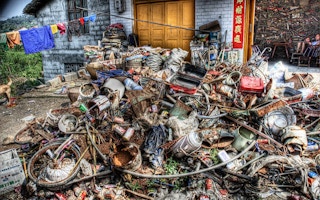With the city’s waste sector “reaching a point of significant transition”, Shanghai’s municipal leaders are moving to learn from trash pickers — and to bring them into the formal establishment.
These insights come from Sustainability Insights: Shanghai’s Informal Waste Management, published in late June by Collective Responsibility, a strategic advisory firm based in China’s commercial capital.
An economic boom across China has fueled consumption and construction, resulting in a surge in garbage — and in a wider variety of forms. Styrofoam, construction debris and packaging are among the materials increasingly entering the waste stream, along with trash shipped from other countries, the authors note.
These trends have intensified pressure on megacities such as Shanghai, where two of five landfills are scheduled to close this year. The municipality is instead constructing five trash incinerators so it can reach its goal of zero waste to landfills by 2020.
In its latest strategic plan, the city of more than 25.2 million states that it aims to dramatically reduce the amount of debris it trucks to landfills over the next five years.
But for now, the tons of additional rubbish being produced have stretched resources, leaving the city unable to process it all. That makes hard-working collectors integral to Shanghai’s waste ecosystem. There are thousands, mostly migrants from the Jiangsu and Anhui provinces, the report says.
[See: From waste picker to recycling manager]
They can take advantage of centres throughout the city to sell what they gather by weight. “A well-established net of buyers exists well within the Shanghai city limits,” the report states, adding that “within under 24 hours, most materials are sent to a factory where the goods would be reprocessed.”
Formalisation plan
Now, pressure is mounting on city leaders to replicate the efficiencies of garbage pickers by bringing them into the fold of the waste-removal establishment. Without them, thousands of tons of refuse would end up in landfills — or worse, be dumped illegally.
The goal is to incorporate thousands of street-level collectors and hundreds of sorting facilities into the municipality’s formal garbage removal framework. “Officials have encouraged this transition for a number of reasons as Shanghai looks to become more efficient, rise to meet global environmental standards, and increase oversight,” the report says.
Motivations include:
- Growing resistance to informal trash collection in neighbourhoods where incomes and living standards are high.
- Concern that some waste is processed by centres that lack environmental certification and fail to dispose of trash properly.
- More transparency and accountability about an unregulated “grey area” of the economy.
To ensure a smooth progression, city leaders have tapped the private sector for guidance, investment and use of their existing recycling infrastructure.
To help achieve those goals, the authors urge national and city leaders to improve monitoring and understanding of the waste business, to ensure that both migrant labourers and the environment are protected. They also recommend greater oversight of collection routes, sorting hubs and treatment facilities.
[See: What can cities learn from Sri Lanka’s landfill tragedy?]
“Shanghai’s waste management sector is reaching a point of significant transition,” forcing government officials to invest in more effective and efficient waste treatment, the report states. “As part of this process, they will need to formalise the informal waste system,” the authors conclude.
Long hours, low wages
Two characteristics of China’s formal waste sector have created the conditions for the bustling unregulated trash trade. First, most local governments in China place little emphasis on recycling and reuse of tossed items, despite the growing need. And second, businesses and construction sites are charged for waste removal by weight. To avoid high fees, they rely on unlicensed workers to remove it.
An estimated 3.3 million to 5.6 million trash collectors in China augment a formal waste management system that is under-resourced and overwhelmed. They range from ragtag entrepreneurs who haul debris via heavy-duty tricycles to private companies that buy and sell garbage.
For unlicensed collectors who work long days, the average daily compensation is about RMB200, or roughly USD 30. They are involved in every stage of the process, from collection and storage to resale or swaps, followed by reprocessing and re-entry into the economy, the report says. For some, it is a side gig; for others, this is a full-time profession.
This story was published with permission from Citiscope, a non-profit news outlet that covers innovations in cities. More at Citiscope.org










